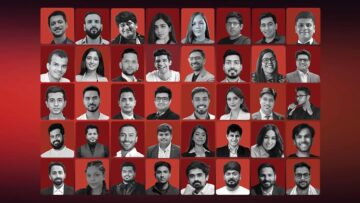
The most commonly used value addition by nearly 2,000 exporters and almost same number of job-workers in Tirupur is printing, and the popularity of the technique is only growing. At a recently concluded exhibition in the ‘knit city’, there were 30 companies from printing segment, emphasizing on the huge market demand for the technology, be it conventional printing techniques or the more modern version of digital printing. Industry watchers feel that while traditional printing will continue to be attractive for investors, it would be digital that will have more scope as the orders which had gone to other countries because of the lack of infrastructure for value additions in knits, are coming back to Tirupur. With decreasing cost of ink and high speed of production, digital is positioned to rule the printing scenario after some years.
Offering screen printing machines of MHM; SS Creations, Tirupur has installed 68 machines in the last two years and is expecting 30 more installations within next one year. Enthusiastic with this response Sundar, CEO, of the company says, “Within six months we may open an office in Delhi, as now we have increased our concentration in other cities, and also recently installed machines in Kolkata and Noida.” The company has 14 engineers for installation of projects and feels that digital printing may be a challenge as there are always possibilities for new things to attract attention, but screen print will never die out, as digital printing is mainly on polyester; and screen print will survive till the knitted fabric-based garment will be in demand. His company is giving online support as machines are attached with Wi-Fi to the central office, which can then react quickly to any need of the machine.

Printex India, a dealer of Printex Poland as well as doing printing job-work, is also very upbeat of the prospects of screen printing in Tirupur. The company has sold 12 machines in the region in two years and is currently having good enquiries too. “We are expecting very good business in next 4-5 years as 12 installations per year are expected. One of the biggest reasons of this hope is that people now have more willingness for automation rather than using manual machine,” says Arun Sivasankaran, Director of the company. He also claims that his machine only requires grease of Rs. 500 per week and there is no other maintenance cost involved.

Printing technology/equipment suppliers claims that job-workers are doing bulk orders and investing hugely in advance machinery also. Now, users are also coming forward to explore/invest in advance/latest technologies. Gurjeet Nayyer, Wenli International Trading is very enthusiastic about heat transfer which he feels has good scope in Tirupur. “Robot type (screen printing) has also attracted users in Tirupur, and they are keenly waiting for it as it removes the manual process and problems. These machines hopefully will be available next year,” he said.
One of the main reasons for this increasing demand and growth of screen printing is the full technically support by all the principals and their dealers. For example Jorge Fernandes, Export Manager, Roq, Portugal claims that they have 16 technicians in Tirupur as well as two trainers. “Fulfilling customer expectation is a challenge as most of the users take the machines for a specific use or for a particular type of job, while we are trying to supply the machine to do all kinds of jobs as our focus is multiple solution,” he said. Ramesh Ganduri, MD, Spoorthi Technologies, representing Roq adds, “Job-workers are investing more than the direct companies as their only focus is printing, There are many job-workers who are approved by buyers and having 10-15 machines under one roof.

C. Panneer Selvam, Sr. Sales Manager of DCC is more than happy as far as growth of digital is concerned in Tirupur market. “Two years ago digital printing was in the initial stage of acceptance in Tirupur but now has grown a lot,” he shared, adding that exporters’ orders are totally based on their buyers while domestic players are free to market designs they make; so in a way they are enjoying the market more than the exporters. Many more job workers are also entering in the digital segment supporting the growth. Though DCC’s core business is of screen printing, but it offers all kinds of printing solutions. Mukesh Kumar Jha, Product Manager –Digital Transfer Printing, Apsom Infotex Ltd., is also of the view that hubs like Tirupur and Erode are now moving towards polyester and printing on such fabrics though digital machines is giving outstanding results; so it is also one of the reasons for the growing demand. Sportswear is changing and has become very high on creative designs, and digital printing is the preferred technology for the same. “Roland is one of the most preferred brands for sportswear and across India we have customers who are exporting sportswear with prints done by our machines,” he said.
Photographic designs are more in demand, both in exports as well as in domestics; hence digital are more in demand as that is considered the forte of digital printing. Also they can produce larger volumes in a short time span.
Printing job-workers gear up to meet growing demand
There are almost 400 printing job-work units in Tirupur that claim to be approved by various buyers/retailers and are following complete norms/compliance as applicable to the international markets. Most of them are geared up for expansion/upgradation.

Approved by Levi’s, H&M, Disney and Primark, K S Image Printers is working with almost 30 exporters on regular basis. K S Senthil Kumar, MD of the company informed, “Market is quite good, lot of varieties are coming into sublimation like 3D print, sublimation in 100 per cent cotton (knitted as well as woven); 100 per cent garment print. We are proud to introduce 3D sublimation in Tirupur by using software from Germany. Even cost wise, 3D print on cotton-based products is just a little higher, which is not an issue for exporters. We have the capacity of 5,000 piece in sublimation (EPSON F-7170), 10,000 in automatic printing (10-12 colour print and two persons enough for that) and 5,000 in table printing per day. In future we are going to install reactive (panel form) in big way and DTG in low price.
Along with the focus on organic kids garment, Macrofast is also concentrating on digital printing. The company is working with reactive roll form and digital printing, as also screen with oval structure, which according to him is the latest trend. Rajesh Babu KRA (ex-NIFTian) says, “I think it is a breakthrough in the printing technology where one can incorporate screen technology with the digital. It is the best option for those who are looking for change as well as cost-effectiveness as compared to digital. The companies have printing capacity of 4,000 metres a day as they have all facilities in-house. “Market is picking up but cost is an issue. We are planning to add one more such printing machine to enhance our capacity,” says Rajesh.

Rajdeep Clothing Company, having specialization in digital textile printing, is into this field for the last four and a half years and to cope up with the cost it is using the digital plus screen technology (hybrid concept). This concept gives enough creative space to company’s designers to experiment, while giving better hand feel too. “Going forward, the future is brighter for us, be it increasing demand of printing or decreasing of cost,” says Deepak Siddharth, CEO of the company.
The concept can print beautifully on 100 per cent cotton, dark or light coloured garment. “Screen printing is getting saturated but it will be always there as nothing can replace it. Sublimation too will not grow further, I see more scope only for this hybrid concept, and this could be a future. As we have enough experience we are more familiar with this machines/technology compared to most of the other users,” adds Rajesh.
The company expects to grow at least by 2-3 times. Till now, with 3 Kornit printers, they can print up to 2,000 tees per day, but going forward the capacity will increase to 10,000 pieces per day as they have recently installed a hybrid Chinese machine (Tex Talk) with a cost of Rs. 1.5 crore.

Sonal in Tirupur, one of the well-known names in processing/job-work industry, is having 5 units and serving the industry as a complete process house for garments. G. Thiyagaraj, MD of the company who is basically a concept creator in garment dyeing feels, “Due to reasons like cost-effectiveness, less labour requirement, quick production, good feel, increasing use of polyester-based fabrics, right now sublimation is more in demand. Now we are moving to digital, though it is a little expensive, we are going for it.” The company has garment dyeing capacity of 3.5 tonnes per day. Lava dyeing and acid wash are among the latest developments of the company. Quick service is the edge of the company as it has good infrastructure. It also claims to do indigo dyeing into garment which is only possible in yarn. “We have developed our own technique to do this, and took us three years to develop,” he says.






